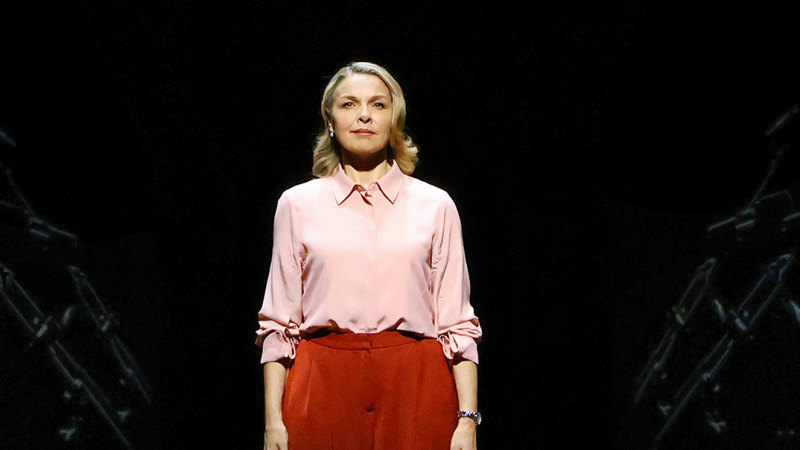JULIA
Drama Theatre, April 4
Until May 20
Reviewed by JOHN SHAND
★★★★
It builds like a storm. You see the cloud-front of abuse, disparagement and disrespect lining the horizon from the outset, gradually growing closer, darker and more intense, until the last 15 minutes of Joanna Murray- Smith’s play about Julia Gillard become an inevitability: the anti-misogyny speech the then-Prime Minister delivered in the Australian Parliament on October 9, 2012. This not only scorched the hide of its direct target, opposition leader Tony Abbott, it also shook the chamber’s walls and echoed around the world as a rallying cry that enough was enough.
The barebones staging heightens the sense of Gillard being alone.Credit:Prudence Upton
Murray-Smith’s new play details the appalling treatment of Gillard by Abbott and his party (including the women and infantile Young Liberals), his sycophants in the Murdoch media, the spiteful Alan Jones and even one-time feminist Germaine Greer. But the play mainly contains the imagined thoughts of Gillard along the way. The writer’s narrative skill is plain in the build-up, in the conclusion’s inevitability and in the fact a verbatim delivery of Gillard’s speech slots so seamlessly into the play.
It’s essentially a one-hander, with the Justine Clarke as Gillard, although Jessica Bentley is also intermittently present in a primarily non-speaking role. Sarah Goodes’ unfussy yet precise Sydney Theatre Company production (subtly shaded by Steve Francis’ music) casts Clarke adrift on a wide, empty stage, which designer Renee Mulder has framed with reflective screens, so the sense of Gillard being alone is infinitely compounded. If she is to survive the vitriol, she must do it unaided; must dig inside the depths of her being until out pours a speech that was extemporised, apart from some researched examples of Abbott’s sexism.
The play essentially a one-hander, although Jessica Bentley is also intermittently present.Credit:Pruedence Upton
As recently as January, Clarke was performing the bruising Girls and Boys, another one-woman show. To march from one straight into another is nothing less than heroic. The demands on her memory are monumental, and she has nowhere to hide.
Murray-Smith has understood the implications of one actor carrying 90 minutes of drama, and has gifted Clarke variations on her character. One is a narrator (albeit from Gillard’s point of view), the second is that narrator, but now sliding into Gillard’s voice for certain lines, as if slipping between dimensions. The third is Clarke as Gillard to deliver the speech, the actor transforming herself before our eyes with wig and costume, assisted by Bentley. Even without visual aids, Clarke is so good that when she plays Abbott, her face becomes his on a level above bald mimicry.
Earlier on, we meet Gillard’s Welsh father, telling her of the mining catastrophes in the land of her birth; the same father whom, when he died, Jones would claim died of shame for his daughter’s lies. The real shame lay elsewhere. This young Gillard wanted to be a teacher, became a lawyer, and entered politics with a keen ear for the nuanced relationship idealism and pragmatism. She gives us her version of the difficulties of working with Kevin Rudd before the coup that made her PM, and reminds us of the record 570 bills her minority government passed through the parliament.
The speech came as a response to a motion by Abbott castigating her for supporting the undesirable Speaker Peter Slipper – whom Murray-Smith has Gillard say looks like “someone who imports heroin in coconuts”. The speech’s delivery drew spontaneous applause, and one sensed the standing ovation at the end was as much for Julia Gillard herself as for Clarke or Murray-Smith. My star rating leaves out the hero worship for the former PM.
Most Viewed in Culture
Source: Read Full Article


